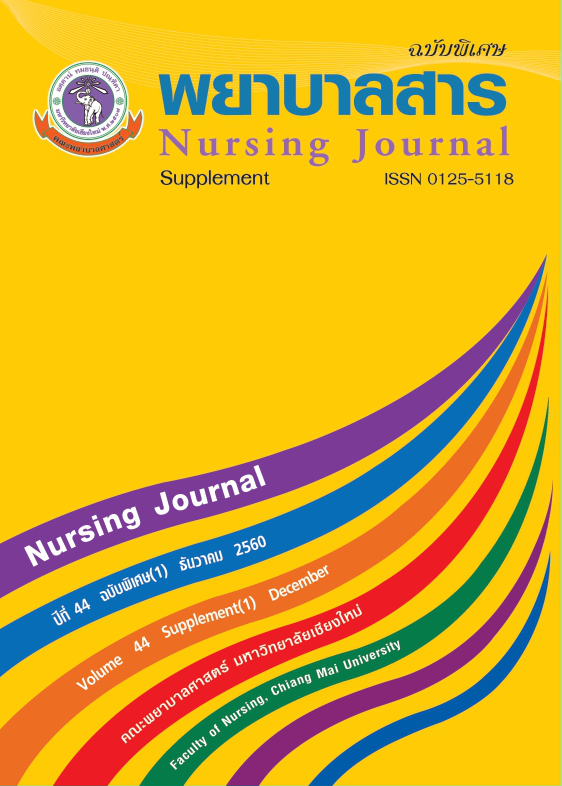Stress, Social Support, and Fathers’ Functional Status
Keywords:
Stress, social support, fathers functional statusAbstract
Fathers’ functional status is the faher’s usual activities that leads to the good health outcomes of fathers, mothers and infant. The purpose of this descriptive correlational research study was to explore stress, social support and fathers’ functional status. The subjects were selected according to inclusion criteria and consisted of 102 first-time fathers whose wives were in the 6 to 8 week postpartum period and accompanied their child to the well child clinic at Queen Sirikit National Institute of Child Health and Department of Pediatrics Phramongkutklao Hospital from June to August 2014. The research tools were the Suanprung Stress Test-20, developed by Suwat Mahatnirunkul, Wanida Pumpaisalchai and Pimmas Tapanya (1997), the Father Social Support Questionnaire, developed by Supakorn Chaina and Nantaporn Sansiriphun (2013) and the Fathers Functional Status Questionnaire, developed by Nontika Kongmanee, Nantaporn Sansiriphun, and Chavee Baosoung (2015). The reliabilities of the research tools were 0.81, 0.85 and 0.93, respectively. Descriptive statistics and Spearman’s product moment correlation were used to analyze the data.
Results of the study revealed that:
- First-time fathers had level of stress at 50.1 % and the mean score of stress was 27.8 (S.D. = 11.74).
- Most of first-time fathers had a high level of social support at 69.6% and the mean score of social support was 3.75 (D. = .43).
- Most of first-time fathers had a high level fathers’ functional status at 84.3% and the mean score of fathers’ functional status was 3.17 (D. = .25).
- Social support had moderately statistically significant positive correlation with father functional status among first-time fathers (r = .509, P < .01).
- Stress was no statistically significant correlated with father functional status.
The findings from this study can be used as baseline data for promoting fathers’ functional status.
References
ไปยดา วิรัศมี. (2552). สัมพันธภาพของบิดามารดาและปัจจัยครอบครัวที่ส่งผลต่อพัฒนาการและความฉลาดทางอารมณ์ในเด็กปฐมวัย (วิทยานิพนธ์วิทยาศาสตร์มหาบัณฑิต สาขาวิชาพัฒนาการมนุษย์). บัณฑิตวิทยาลัย, มหาวิทยาลัยมหิดล.
รุ้งรวี เต็งไตรสรณ์. (2544). ความเครียด การสนับสนุนทางสังคมและการปรับตัวด้านบทบาทหน้าที่ของบิดาที่มีบุตรคนแรก (วิทยานิพนธ์พยาบาลศาสตร์ดุษฎีบัณฑิต การพยาบาลแม่และเด็ก).บัณฑิตวิทยาลัย, มหาวิทยาลัยมหิดล.
ศุภกร ไชยนา, นันทพร แสนศิริพันธ์ และกรรณิการ์ กันธะรักษา. (2558). ความเครียด การสนับสนุนทางสังคม และการเข้ามามีส่วนร่วมของบิดาในระยะหลังคลอด. พยาบาลสาร, 42(1), 85-96.
สุวลักษณ์ มีชูทรัพย์. (2544). ปัจจัยที่มีผลต่อพฤติกรรมของบิดาในการเลี้ยงดูบุตรคนแรก. (วิทยานิพนธ์วิทยาศาสตร์มหาบัณฑิต สาขาสุขศึกษา). บัณฑิตวิทยาลัย, มหาวิทยาลัยเกษตรศาสตร์.
สุวัฒน์ มหัตนิรันดร์กุล, วนิดา พุ่มไพศาลชัย และพิมพ์มาศ ตาปัญญา. (2540). รายงานการวิจัยเรื่องการสร้างแบบวัดความเครียดสวนปรุง. เชียงใหม่: โรงพยาบาลสวนปรุง.
Ahmeduzzaman, M. & Roopnarine, J. L., (1992). Sociodemographic factors, functioning style, social support, and fathers’ involvement with preschoolers’ in African-American families. Journal of Marriage and Family, 54, 699 – 707.
Allen, S. & Daly, K. (2007). The effects of father involvement: An updated research summary of the evidence. Father Involvement Research Alliance. Retrived January 10, 2015, from www.fira.uoguelph.ca
Bartlett, E. E. (2004). The effects of fatherhood on the health of men: A review of the literature. Journal of Men’s Health & Gender, 1(2-3), 159-169.
Craig, L., & Mullan, K. (2012). Australian fathers’ work and family time in comparative and temporal perspective. Journal of Family Studies, 18(2-3), 165-174.
Diemer, G. A. (1997). Expectant fathers: Influence of perinatal education on stress coping and spousal relations. Research in Nursing & Health, 20, 281–293.
House, J. S. (1981). Work stress and social support. Mass: Addison – Wesley.
Janprasert, P. (2005). Factors influencing on paternal developmental tasks perceived by husbands of the primigravidarum pregnant women in Suphanburi Province (Master’s thesis, Public health nursing faculty of graduate studies Mahidol University, Bangkok, Thailand).
Jordan, P. L. (1990). Enhancing understanding of the transition to fatherhood. International Journal of Childbirth Education. 22(2), 4-6.
Lu, L. (2006). The transition to parenthood: Stress resources and gender differences in a Chinese society. Journal of Community Psychology, 34(4), 471-488.
McVeigh, C.A. (1997). An Australian study of functional status after childbirth. Midwifery, 13, 172-178.
McVeigh, C. A., Baafi, M., & Williamson, M. (2002). Functional status after fatherhood: A Australian study. Journal of Obstetric, Gynecologic, and Neonatal Nursing, 31(2), 165-171.
McVeigh, C., John, W. H., & Cameron, C. (2005). Fathers’ functional status six weeks following the birth of a baby: A Queensland study. Australian Midwifery Journal, 18(1), 25-28.
Miller, L. H., Smith. A. D., & Rothstein. L. (1993). The stress solution: An action plan to manage the stress in your life. New York: Pocket book.
Palkovitz, R. (2007). Transitions to fatherhood. In S. E. Brotherson & J. M. White (Eds.),Why fathers count (pp. 25-41). Harriman, TN: Men's Studies Press.
Patulny, R. (2012). Social contact, efficacy and support amongst Australian fathers. Journal of Family Studies, 18(2-3), 222-234.
Poh, H. L., Koh, S. S. L., Seow, H. C. L., & He, H. G. (2010). First-time fathers' experiences and needs during pregnancy and childbirth: A descriptive qualitative study. Midwifery, 30, 779-787.
Polit, D. F. (2010). Statistics and data analysis for nursing research. (2nd ed.). New Jersey: Pearson Education.
Pollock, M. A., Amankwaa, L. C., & Amankwaa, A. A. (2005). First-time father and stressors in the postpartum period. The Journal of Perinatal Education, 14(2), 19-25.
Premberg, Å., Hellström, A. L., & Berg, M. (2008). A view from inside the family - becoming a father experiences of the first as father. Scandinavian Journal of Caring Science, 22, 56–63.
Ravn, I. H., Lindemann,R., Smeby, N. A., Sandvik, L., & Smith, L. (2012). Stress in fathers of moderately and late preterm infants: A randomized controlled trial. Early Child Development and Care, 182(5), 537 –552. doi: 10.1080/03004430.2011.564279
Sevil, Ü., & Özkan, S. (2009). Fathers’ functional status during pregnancy and the early postnatal period. Midwifery, 25, 665-672.
Singh, D., & Newburn, M. (2000). Becoming a father: Men’s access to information and support about pregnancy, Birth and Life with a New Baby. London: National Childbirth Trust.
Tulman, L., Fawcett, J., & Weiss, M. (1993). The inventory of functional status-fathers development and psychometric testing. Journal of Nurse-Midwifery, 38(5), 276-282.
Downloads
Published
How to Cite
Issue
Section
License
บทความที่ได้รับการตีพิมพ์เป็นลิขสิทธิ์ของวารสารพยาบาลสาร
ข้อความที่ปรากฏในบทความแต่ละเรื่องในวารสารวิชาการเล่มนี้เป็นความคิดเห็นส่วนตัวของผู้เขียนแต่ละท่านไม่เกี่ยวข้องกับมหาวิทยาลัยเชียงใหม่ และคณาจารย์ท่านอื่นๆในมหาวิทยาลัยฯ แต่อย่างใด ความรับผิดชอบองค์ประกอบทั้งหมดของบทความแต่ละเรื่องเป็นของผู้เขียนแต่ละท่าน หากมีความผิดพลาดใด ๆ ผู้เขียนแต่ละท่านจะรับผิดชอบบทความของตนเองแต่ผู้เดียว






